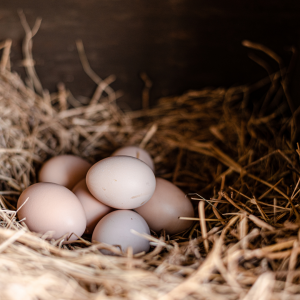When you first start raising chickens, there are a lot of new terms that you have to learn. You’ll quickly become familiar with the differences between roosters and hens. You’ll be able to quickly tell the difference between different breeds, even if they have similar names like Bantam and Brahma. One topic that can still be slightly confusing is the difference between infertile eggs and fertilized eggs. We’re going to go over the difference between the two types of eggs here.
What’s the difference between an infertile egg and a fertilized egg?
Wait, you mean there’s a difference? If you want to get technical, then yes, there’s a difference between the two, even though they have very similar names. In order to better understand the difference between the two, let’s take a quick look at how chicken reproduction takes place.
A hen’s reproductive system is constantly in the process of producing eggs to lay. In fact, it takes most hens an average of 24-26 hours to produce an egg. This process includes developing a yolk, adding the albumen (AKA egg white), the membranes and the shell.
Chicken reproductive systems are unique in the way that they work. Since a hen can lay an egg almost every day, the hen’s body was designed to store rooster sperm. A hen’s reproductive system can hold viable rooster sperm for several months. The reason for this is that there is a small window of time when an egg can be fertilized. The majority of the time that is spent making an egg is actually dedicated to putting the hard shell on the outside. This process takes roughly 20 hours to complete. Obviously, the sperm cannot reach the yolk to fertilize the egg once the shell is in place, so the sperm needs to reach the yolk well before that process starts.
In order for an egg to be fertilized, it needs to have sperm present when the yolk is being developed. The yolk is actually the hen’s reproductive cell, or ovum. Once the yolk is fertilized by a sperm cell, the egg can be considered fertilized.
A fertilized egg can be incubated and hatched to produce a chick. Sometimes you’ll see them referred to as ‘fertile’ eggs, but this is a slang term (since technically all eggs are fertile, which means it can be fertilized).

Does the difference between infertile and fertilized eggs matter?
It depends on what you’re using your eggs for. If you are eating them, then there’s no difference in the two. A fertilized egg and unfertilized egg will taste exactly the same. There is a myth that fertilized eggs will have more nutritional value, but this is simply a myth. The chemical (and therefore nutritional) differences between the two are so minimal that tests in a lab have a hard time telling the difference in freshly laid eggs.
If you’re incubating your eggs, then there will be a profound difference. Eggs that are fertilized can be incubated and hatched to grow a chick. This process takes 21 days to complete. If you’re candling your eggs during incubation, you’ll be able to see the blood spot develop, followed by veins, the eyes, and soon after, a chick. You can incubate infertile eggs for 21 days and you won’t end up with a cute, fluffy chick at the end.
In the end, if you’re just raising your chickens to get fresh eggs, then the difference between fertilized and unfertilized eggs won’t matter. You will want to monitor your hens and make sure they have fertilized eggs if you’re planning on letting them brood or if you want to incubate your eggs. If you aren’t sure about your eggs and if they’re fertilized or not, you can candle them a few days after they are laid to look for a visible blood spot and developing veins.